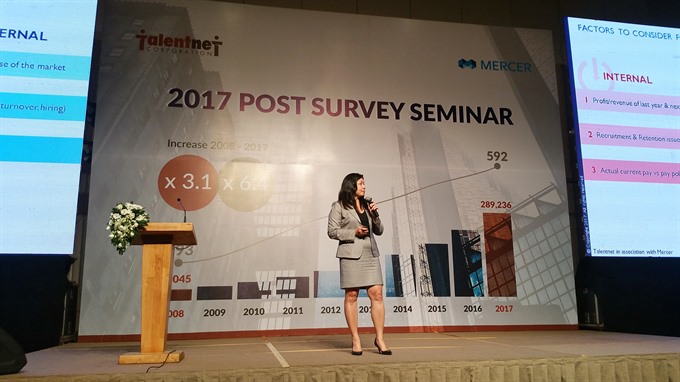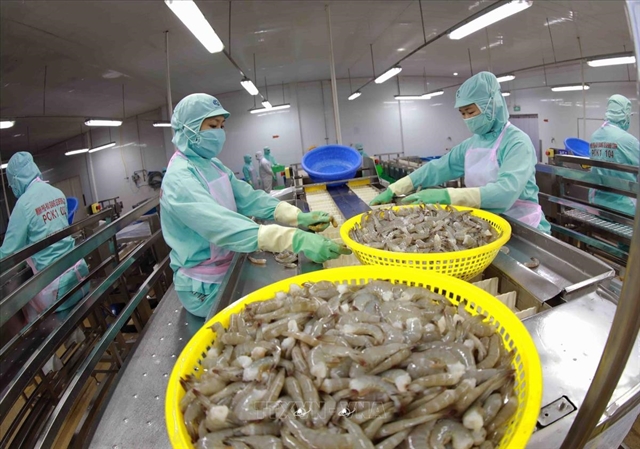 Economy
Economy

Salary increases this year at both multinationals and major local companies have in general been higher than inflation rates, a survey by Mercer, a global provider of human resource services, and Talentnet Corporation, its associate in Việt Nam, has found.
 |
| Hoa Nguyễn, senior director of Talentnet, speaks at the Talentnet-Mercer Post survey seminar held in HCM City on October 6. — VNS Photo |
HCM CITY — Salary increases this year at both multinationals and major local companies have in general been higher than inflation rates, a survey by Mercer, a global provider of human resource services, and Talentnet Corporation, its associate in Việt Nam, has found.
Speaking at the Talentnet-Mercer Post survey seminar held in HCM City on October 6, Hoa Nguyễn, senior director of Talentnet, said though 4.9 per cent inflation was forecast for this year, multinationals and local companies had offered employees salary increases respectively of 8.5 per cent and 8.9 per cent.
"Workers can expect even better remuneration next year when inflation falls further to 4.8 per cent and salary increases are expected to be 8.7 per cent and 8.8 per cent," she said.
Talking about pay hikes by industry, she said technology, life sciences and chemicals were the top three sectors in increasing salaries, with their hikes at 9-10 per cent.
At the other end of the spectrum were education, financial services-banking and oil and mining with 7 per cent, 5.7 per cent and 4.6 per cent hikes.
With a better forecast for business growth in 2017-18, companies plan for a higher variable bonus payout compared to last year.
Agriculture, banking and finance topped the variable bonus list with payouts of 22.1 per cent, 20.7 per cent and 20.7 per cent.
Leading local companies continued to pay higher variable bonus (22.1 per cent) rates than multinationals (16.6 per cent).
But the average salary paid by local companies is 29 per cent lower, and the difference widens from 15 per cent (para-professional) to 30 per cent (professional) and 41 per cent (management), according to Hoa.
On the other hand, local companies are willing to be flexible to compete with multinational companies for key talents.
According to the survey, the average voluntary staff turnover rate of local companies is higher than multinationals’(10.5 per cent compared with 7.4 per cent).
The highest turnover rates for multinationals by industry were retail (32.2 per cent), real estate (18.8 per cent), and consumer goods (17.3 per cent) while chemicals and oil and mining had low rates of 9.9 per cent and 5.3 per cent.
Sales and marketing continue to be the hottest jobs while there is a short supply of engineering professionals that recruiters are struggling with.
A total of 592 established multinationals and local companies with more than 289,200 employees in 16 industries took part in the survey, considered the largest and most comprehensive in Việt Nam. — VNS




